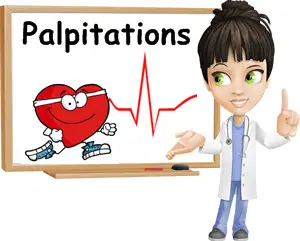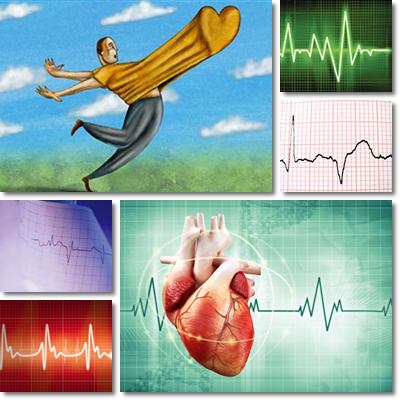Many people report having experienced abnormal heartbeats characterized by various symptoms of irregularity, most common fast heartbeats or the feeling of a racing heart. Usually, palpitations also describe particularly hard heartbeats that often leave one feeling dizzy, sweating or out of breath.
Though chest symptoms are common, it is not unheard of to feel heartbeats either at the base of the neck or on the left side of the chest.
In essence, heart palpitations start with the unpleasant feeling of awareness of one’s heartbeat. In other words, you start hearing or feeling your every heartbeat, instead of ignoring it.
While they can have a benign cause, stress or anxiety, for example, it is always best to go see a doctor so you rule out any potentially threatening heart condition. Also, having the reassurance that your heart is healthy can represent an important step in treating palpitations caused by stress, anxiety or other similar benign cause.

Normally, our heart works best from 60 to 100 regular beats per minute, depending on each person in particular (age, weight, level of physical activity and other factors have a direct impact on heart rate).
People who exercise a lot can manage to lower their heartbeats under 60 beats per minute and anyone may easily experience more than 100 beats per minute when exercising, especially in situations that presuppose intense physical effort (running, for example). The problem is when our heart rate goes under 60 or over 100 when we are resting.
If your heart rate exceeds 100 beats per minute when you are in a resting position such as sitting quietly in a chair, then it’s tachycardia. If you have fewer than 60 heartbeats per minute in a resting position, then you have bradycardia. If your heart is beating irregularly, it’s arrhythmia. And when you feel like you’ve skipped a heartbeat, it’s extrasystoles.
All of these things may happen from time to time and are generally no reason for concern as long as they do not reoccur. If they do reoccur, it is best to ask your doctor for an EKG, or an electrocardiogram test. It’s an easy, quick and painless way to monitor your heart’s electrical activity.
There are numerous potential causes for heart palpitations, most of which are treatable and reversible with a good diet and lifestyle habits and a bit of self-care.
Find out below what are 9 possible causes for heart palpitations.

What causes heart palpitations?
1) Low potassium levels in the blood
Potassium is an electrolyte, a substance that favors the transmission of nerve impulses from our brain to our muscles, and heart, hence its pivotal importance for cardiovascular health. Sweating a lot as a result of intense physical exercise or fever, having diarrhea or a diet poor in potassium-rich foods leads to a shortage of the electrolyte in the body.
In turn, having low potassium levels in the blood contributes to abnormalities in heartbeat and heart rate such as palpitations.
2) Low blood magnesium levels
Magnesium and potassium work together towards good cardiovascular health. While potassium creates the perfect environment for nerve electrical impulses to reach the heart muscle, magnesium keeps the heart healthy and working, preventing any abnormality that may cause palpitations.
3) Heart valve abnormalities or thyroid problems
It is possible for heart valve problems to cause palpitations. If this is the case, it is best to seek professional treatment from a cardiologist. Also, a hyperactive thyroids may cause heart palpitations. Other causes include low blood sugar levels, vagus nerve problems or pregnancy.
4) High caffeine intake.
Coffee, caffeinated drinks such as some soft drinks, green tea, black tea, even white tea, dark chocolate and cocoa all stimulate the heart to work faster, hence their false energizing effects.
Drinking one or two cups of coffee in the morning stimulates our heart to work in a rhythm that is not normal for it, pushing it to its limits, hence the common side effects of coffee consumption: hypertension, arrhythmia, extrasystoles and heart palpitations, to name a few .
Moreover, coffee increases the risk for vitamin and dietary mineral deficiencies, notably potassium and magnesium. For these reasons, anyone suffering from arrhythmia, heart palpitations, extrasystoles or any kind of heart problems should avoid consumption or, at least, reduce intake as much as possible.
Find out 6 reasons why coffee is bad for you.
5) Smoking and drinking alcohol
Both active and passive smoking is dangerous for our health. When it comes to our heart, the nicotine in cigarette smoke may engender serious changes in heart activity and result in arrhythmia, extrasystoles or palpitations. Also, over the course of the years, smoking can increase the risk for cardiovascular disease and stroke. Alcohol consumption is just as bad.
6) Medication
Any medicine we take has side effects, some apparently innocent, some not so innocent. Some medicines, for example, inhibit vitamin and mineral absorption, resulting in deficiencies. Most antidepressants, for instance, can cause a magnesium deficiency. This, in turn, can contribute to depression symptoms or heart problems such as palpitations. Asthma medication, nasal decongestants, diabetes or thyroid gland medication can alter our heart’s normal activity as well.
7) Diet pills
As much as it may hurt to hear it, diet pills as well as herbal remedies claiming to miraculously help you lose weight are all a hoax as they trick our body into eating less, alter liver metabolism or make use of who knows what other unnatural mechanism that ends up hurting our body more than it helps it, that is if they even work.
More often than not, they engender nutrient deficiencies which may result in health problems such as digestion and malabsorption problems or heart symptoms such as palpitations.
8) Fever caused by colds, flu or other infections
Maybe you have noticed that whenever you have an infection of some sort and your body has to fight its way out of it, you get fever and along with it, heart problems such as palpitations. This is a normal response and indicates our immune system is actively trying to remove dangerous pathogens.
Similarly, palpitations caused by high fever should end as soon as the fever breaks as they are merely a symptom of an over-stressed heart.
9) Stress, anxiety and panic attacks
They are three of the most common causes of palpitations. Everyday life doesn’t always allow for us to sit back and think about our actions, results, problems and success, so we move along in a hurried pace that eventually wears us out.
This, in turn, makes us fear we might not be able to keep up with life and we might thus develop anxiety or other nervous disorders, extrasystoles or heart palpitations and so on.
Stress and anxiety increase the body’s production of stress hormones such as cortisol and adrenaline and overexcite the vagus nerve controlling the heart (and digestive tract), hence the fluttering heart or hard heartbeat sensations.
Prolonged stress may also engender nutrient deficiencies that further aggravate palpitations. As you can see, it’s all a neverending cycle.
When we are under a lot of stress, it is important to take a step back and breathe. Think about our priorities and start making time for the things we love doing. Go for a bike ride if that makes you happy, watch that movie you’ve been wanting to for so long, play with your children, your dog or go on that vacation you’ve worked so hard for.
Life isn’t all about sacrifices and you have the right and obligation to enjoy yourself. Start making small, positive changes that will turn into deep-rooted habits for you and your dear ones. And do not be afraid to let go of anything or anyone toxic in your life.
What to look out for
Palpitations can be successfully kept under control and even remedied. However, seek medical help if you are experiencing one or more of the following symptoms:
1) Dizziness and lightheadedness.
2) Upper abdominal or chest pain that does not disappear when changing position.
3) Sudden cold sweats.
4) Loss of consciousness.
Here is a list of tests your doctor might recommend to you to try to pinpoint the cause of your palpitations and determine the best course of action to treat them:
1) Electrocardiogram (EKG or ECG).
2) Blood pressure measurement.
3) Coronary angiography to see inside you arteries.
4) Holter monitor which you carry with you for 24 or 48 hours to record your heart’s electrical activity.
5) Echocardiogram or ultrasound scan of the heart.
6) Blood tests to monitor thyroid gland hormone production.
